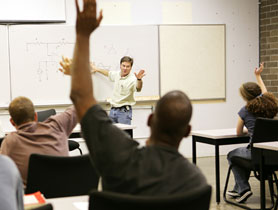April 8, 2014
We Learn More in Spacious, Intimate, and Safe Places
Nota - Este artículo es disponible en español aquí.
 How can we be part of the realization of the dream of adult Latino immigrants to return to the schools, vocational schools or universities in our communities to finally be able to finish or start careers they had to set aside, or to study subjects that they always wanted to explore? How can we help guide them so that this new learning experience will be an unhurried, transforming and joyful one?
How can we be part of the realization of the dream of adult Latino immigrants to return to the schools, vocational schools or universities in our communities to finally be able to finish or start careers they had to set aside, or to study subjects that they always wanted to explore? How can we help guide them so that this new learning experience will be an unhurried, transforming and joyful one?
The story of how Maria Eugenia Carranza managed to obtain a college degree in elementary education is an example that the members of our communities who wish to return to a community college or a university to complete their education should take into consideration.
At 55 years of age, Maria Eugenia, as many other persons of her generation, arrive in educational institutions with learning experiences ranging from the horror of still feeling the stick that hurt their hands or legs or feeling the bony knuckles of the teachers on their scalps, to spending an entire day wearing donkey ears or, even worse, spending endless hours in solitude writing a misspelled word a hundred times or more and finally telling themselves “I am a failure, I have no head for schooling”… not to mention the assault on their identity and the pain felt by children who were not allowed to speak or write their mother tongue. Maria Eugenia tells that she still feels the sting of the stick in her legs and the fear of punishment when she tried to express herself in Spanish, her mother tongue, and her painful feeling that she could not express herself adequately in English, her second language.
One would think that after going through those painful experiences people would be unable to get rid of the pain and the trauma that marked their school years, and that it would be impossible for them the continue on with their lives and their dreams. The way in which Maria Eugenia was able to overcome what she calls “my emotional blocks that didn’t allow me to learn” is due to her great fortune in finding an institution that offered mentors who closely followed her efforts, as well as being able to learn in a suitable environment, such as spacious classrooms with a small number of students and a feeling of intimacy in the house of knowledge, where for the first time in her life she felt safe and confident that she would be listened to, and that she could express herself, reflect, ask questions and simply enjoy the learning process and little by little discover new worlds and expand the frontiers of her knowledge.
Listening closely and reflecting about this life story is extremely important when we adopt or design programs in our congregations aimed at that communities learn, feel safe, be empowered and be able to joyfully perform their best in the ministries in which they chose to serve with love and humility, as Christ teaches us.
A methodology of learning focused in interaction and carried out in an intimate and safe environment, and with no time limits, erases the sequels of a past of imposition, mistreatment and lack of understanding of the ways we learn, regardless of our age or the difficulty and the complexity of the tasks we are given.





